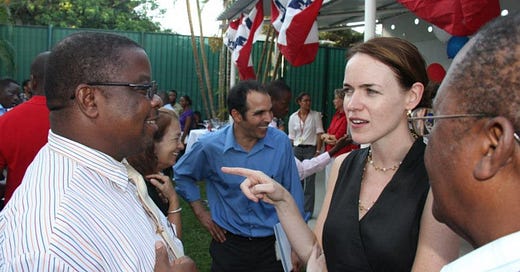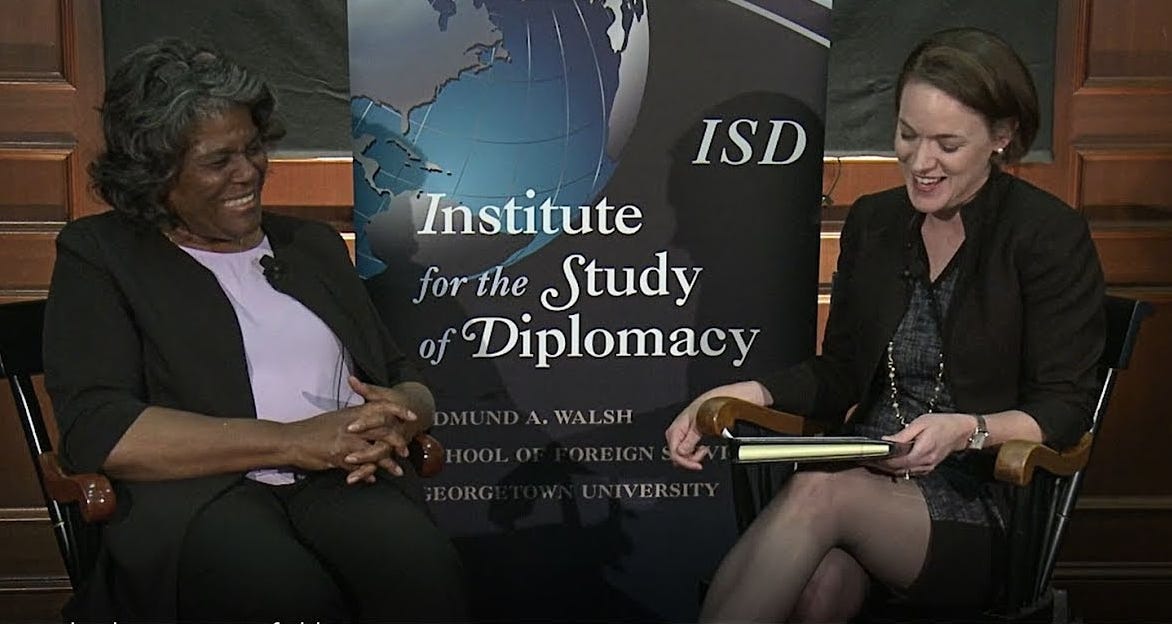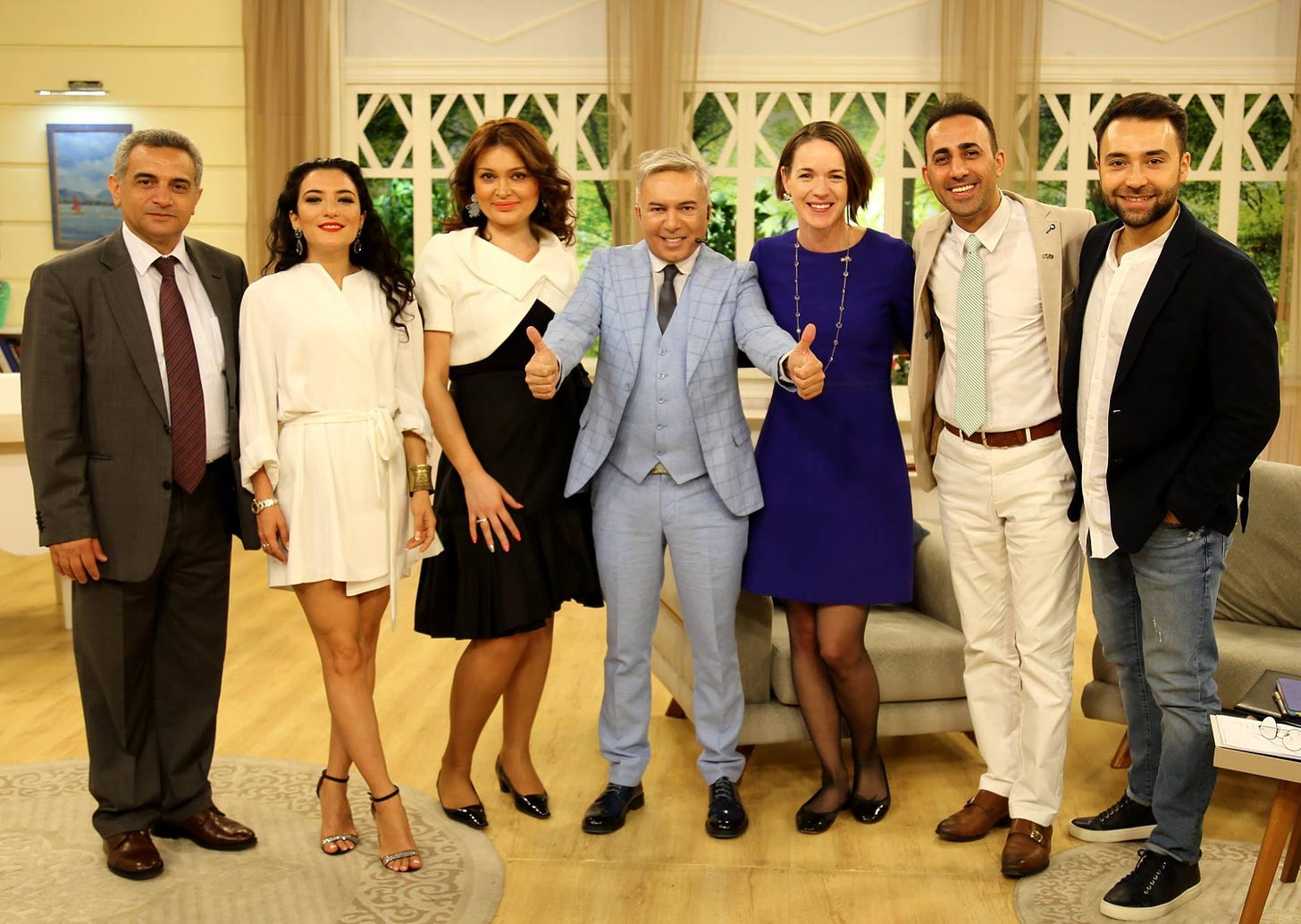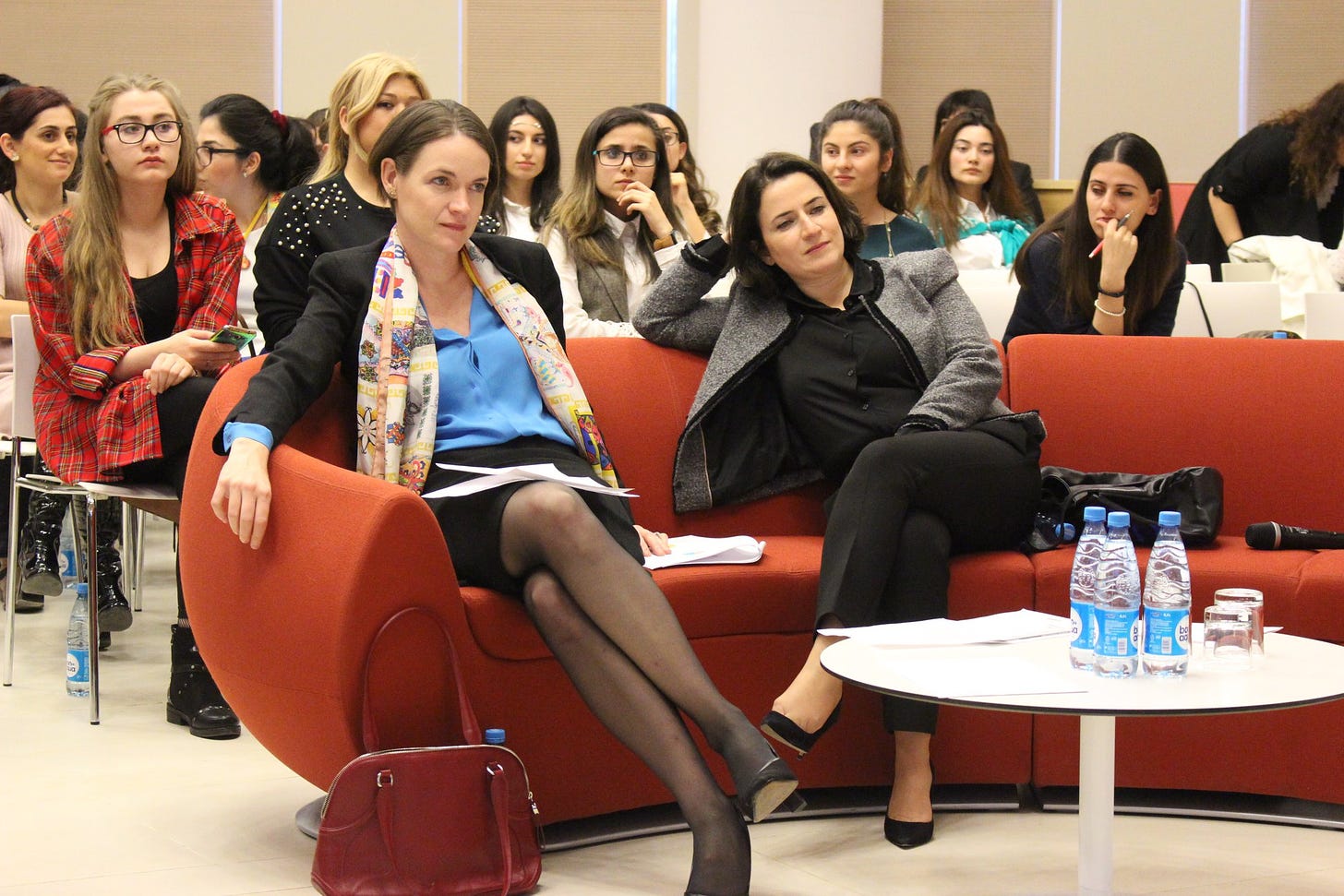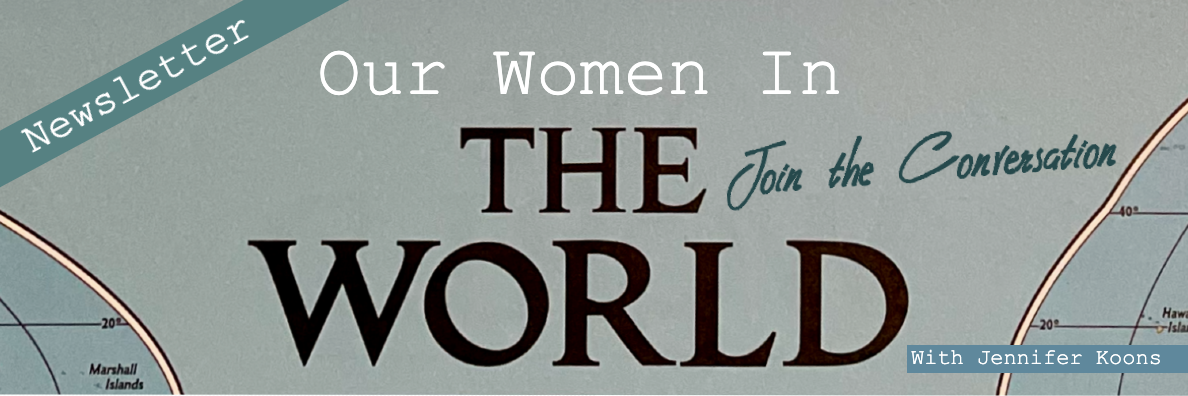In Conversation: Caroline Savage
'I had never felt more alive, focused, and energized in my life.'
Caroline Savage has a way of zeroing in on the most delightful and impactful parts of her life and work in the world.
Even before leaving home, she describes her decision to study abroad in France and Russia as “test[ing] the hypothesis” that she’d want to live outside the United States. The answer? Affirmative, of course. But the initial enthusiasm cultivated via “global map games” with her parents and tales of her mother’s years as a foreign correspondent only deepened after she joined the Foreign Service.
Headed to Kazakhstan this summer as Consul General in Almaty, Caroline reflects back on initial postings; navigating the emotional and logistical challenges of one marriage and two exciting careers (in different places); And the need to, as she says, “disabuse folks of the notion that diverse diplomacy is just something nice to do. Rather, it is a national security imperative.”
Please enjoy getting to know Caroline.
When and how did you know you would be at home in the world?
My global outlook was probably unusual for a girl from suburban Wisconsin, and I credit my parents for this. We spent so many hours playing global map games. My mother would call out a country from the couch, and I would race to find it on the map. My father and I would regularly play a country name-spelling game over pizza. Moreover, my mother’s stories of life as a journalist in London and Johannesburg in the 1970s were as zany and compelling as could be. Where there were crime and airport beats, there were also union protests and political show-downs. Where there were hunting cats and swimming pools, there was also apartheid and social injustice stories to tell the world. From those stories and games, I derived a strong feeling of connection and draw to the world beyond our borders.
As soon as I could, I studied abroad in France and Russia—both in high school and college—and tested the hypothesis that I wanted to live abroad. I still recall vividly the host families with whom I stayed, the feeling of their homes and surrounding neighborhoods, and the long discussions over dinners and teas that challenged my linguistic skills and my worldview and drove me to work harder to deepen and broaden those in the interest of stronger ability to connect.
I had never felt more alive, focused, and energized in my life.
Do you remember the scent, smell, sounds or other visceral impressions from your first posting?
Of course! Because I spoke French, I was sent to Luxembourg for an unusually posh first posting, after I joined the Foreign Service.
Living there for two very full years brought many delights and surprises. I lived on the second floor of a house, and my landlords kindly included me in many family gatherings and outings, adopting me a bit like an exchange host family. They had a beautiful garden across from farm fields not five minutes drive from downtown. The views of that field and the sights of that neighborhood where I walked many miles remain great memories. Downtown Luxembourg was similarly charming and bustling, full of cafes and some of the most delicious scents and foods I’ve ever eaten.
What would most surprise someone on the outside about your favorite part of living and working abroad?
Language can be the absolute key to connecting with the people and culture of a country.
Talking with a taxi driver or grocery salesperson can provide delightful daily discoveries. To this day, I always prefer to visit countries where I can use the language to connect with the local people throughout the journey.
Can you talk a bit about your support network and those people and/or groups in your life that bolster your confidence or remind you of your ambition and desires?
My husband and two small kids ground me and bring joy to every day. My parents and a few great friends are also consistent touchstones, trekking to my postings all over the world and spending hours on the phone at all hours of the day and night. They always remind me of who I was before this career.
For me, they are hugely important to contentment and balance through the many changes and challenges in this career.
Was there a private struggle that you think, reflecting back upon now, might be a comfort or prove instructive for those just beginning their careers?
A lot of junior officers and prospective officers ask me if and how one can have a family in such a transient career, and this was certainly a major question for many in my orientation class.
When my now-husband and I met, we were both fully engaged in separate careers in the Marine Corps and at the State Department, respectively. We met, hit it off, and then proceeded to live on separate continents for four years before we finally moved to Washington D.C.
It was extremely challenging to maintain our connection—both emotionally and logistically—during postings to Luxembourg and Belarus, for me—and in North Carolina, Fallujah, Iraq, and Guantanamo Bay, Cuba, for him. Often the phone lines would cut off our long-awaited and carefully scheduled calls.
We persevered, despite the many lonely months apart, and relished our reunions whenever our full schedules allowed. He eventually left the Marines and joined Diplomatic Security, which has made life more manageable but certainly not easy.
We approach each bidding cycle as a team and carve out a lot of time to touch base as a couple—reviewing and reflecting on our individual and family priorities in order to unify our efforts to lobby for our next assignments.
Recently, I noticed someone had posted on a discussion board asking for the best tips to combat imposter syndrome. So many responded with fantastic and even funny suggestions. But it struck me that it's something so many wrestle with at various points but so few discuss. Have there been moments when you've struggled with imposter syndrome? What would present-day you advise?
Of course, I question myself. I believe any good leader does.
When I face serious bouts of this, I double-down on the work to be sure I’m as well prepared as can be for the job at hand.
At the same time, I intentionally schedule the kinds of self-care I need to reinforce my confidence, which includes time with people I trust, exercise, and rest.
At the same time, what are some of the moments that stand out to you when you felt fully "in the zone" in terms of your ideas or accomplishments? Can you explain that rush or exhilaration of knowing you were the exact person to handle a given situation or resolve a tough problem?
During several periods during my second tour, I served as Charge d’Affaires in Minsk, Belarus. At the time, 30 of our 35 diplomats had been sent home by the Belarusian government. Though some wanted to send a more senior officer out from Washington, my boss argued successfully that I was up to the task. It was a great vote of confidence in my ability to lead our mission during a significant period of change in our bilateral relationship. Especially after many years studying Russian and the politics and culture of the region, it was absolutely great to work in that dynamic country with some of the most wonderful, resourceful, and courageous people I’ve ever met.
What are some ways in which you think the department can address persistent and pervasive gaps in hiring and promoting non-white employees, particular women.
While the Department has had a fairly strong track-record in hiring over the past two decades or so, our retention and promotion rates for diverse candidates have not kept pace.
To me, this reflects the lag in cultural change needed to ensure diverse individuals are not just hired, but included at every decision-making table in such a way that their voices are heard.
There are many ways to tackle this. For one, I think regularly publicizing non-aggregated statistics on hiring and promotions in each bureau will go a long way to incentivize managers to do better at valuing diverse voices.
Fortunately, there are some incredibly dedicated and smart people working hard to resolve these persistent issues, some as full-time staff and many others as volunteers working through employee associations and affinity groups.
What is a pressing foreign policy issue that you think is too often misunderstood, overlooked or ignored?
Diversity and inclusion in foreign policy, not unlike human rights in foreign policy, can be framed as the “nice” thing to do, or a values-based approach. I’ve heard people say, “Well, I didn’t pick the diverse candidate” for a job that they ‘just want to get done.’
What is lost in those frameworks is that diverse, inclusive teams are actually better at problem-solving and team-building.
Time and again, studies show businesses to be more profitable when their governing boards are more diverse and inclusive. This is because those very perspectives are the ones who can point out what is missing or problematic about information flow or analysis needed to develop innovative solutions. We need to disabuse folks of the notion that diverse diplomacy is just something nice to do. Rather, it is a national security imperative.
Finally, can you share what is keeping you up at night and what is what is giving you hope?
I am increasingly concerned about the proliferation and profound negative impact of disinformation on truth, journalism, and public policy.
Public policy, including foreign policy, have always been hard to get the public to understand and care about. Now fighting disinformation adds further complexity to ensure accurate, truthful information is available, believed, and understood.
This concerns me both on a national and global level, as I don’t think we fully grasp the extent of mobilization needed to address this challenge.
My hope lies in the brilliant, dedicated people joining and committing to stay in public service through these unprecedented challenges and bringing all their life’s blood to helping solve these problems.
Caroline Savage is a career Foreign Service Officer who served most recently as Director of the U.S. Department of State’s Foreign Press Center. As non-resident fellow at Georgetown’s Institute for the Study of Diplomacy, her focus is diverse diplomacy leadership in foreign affairs, a project she began during her tenure as Virginia and Dean Rusk Fellow at ISD from 2018-2019. Prior to Georgetown, she served as Public Affairs Officer at U.S. Embassies Azerbaijan and Mozambique. In Washington assignments, she was Director for Russia and Central Asia on the National Security Council and Political-Military Officer in the U.S. Department of State’s Office of Russian Affairs. She also served previously in Belarus and Luxembourg. A native of Wauwatosa, Wisconsin, she graduated from Georgetown University’s Edmund A. Walsh School of Foreign Service, then received master’s degrees in Russian, East European and Central Asian Studies and Political Science from the University of Wisconsin-Madison. Her languages are French, Russian, Portuguese and Azerbaijani.
Know a Woman in Foreign Policy Who Should Join our Conversation?
Share in the comments below or email me at jennifer.koons@protonmail.com.


